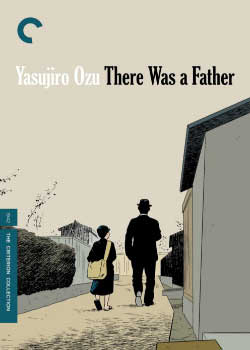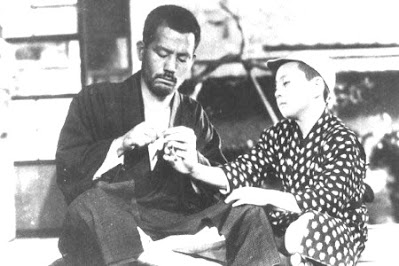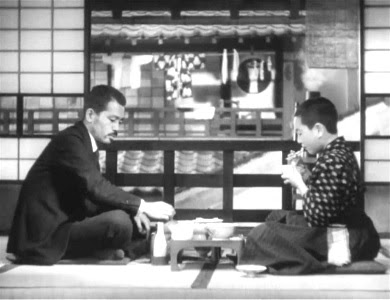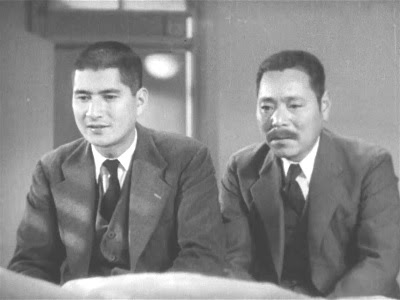There was a Father

Director: Yasujirô
Ozu
Year:
1942
Rating: 7.0
This was to be Yasujirô Ozu's last film
during the war years. His next film was Record of a Tenement Gentleman in
1947. Ozu was pulled back into the military after this film though this time
as a filmmaker and was sent to Singapore to make a documentary on Chandra
Bose, an Indian nationalist who was strongly anti-British. Like his previous
film, Brothers and Sisters of the Toda Family, it is as if there is no war
raging in the Pacific with the first Allied bombings of Japan taking place
in April of 1942. There were apparently some patriotic songs and poetry in
the film but those parts were edited out after the war and had not been reinserted
into this dvd though they do apparently exist. Still the film is so focused
on duty, on being the best that you can be that one has to imagine this was
a stern message to all the Japanese. No matter your job, no matter your position,
no matter your personal feelings, duty comes first. You are being depended
upon by society. This insistence on duty between father and son though leads
only to isolation and seems at times to be cruel. Though I am not sure that
was what was meant. It just struck me that way. It is hard not to think about
one's own relationship with their father while watching this.

The film spans about 20-years in the relationship
of Shuhei (Chishû Ryû) and his son Ryohei (Shûji Sano as
an adult). The wife/mother has already died before the film begins and Shuhei
is bringing up his son on his own. As both are getting ready to go to school
- Shuhei as a math teacher and Ryohei as a student, the son mentions that
his shoes are almost worn out and the father says they are still good for
a while. This immediately places the father into a lowly economic status.
He throws some geometry questions at his son and they are answered correctly
and they are on their way. Everything soon changes. On an outing with his
students one of them drowns and feeling responsible Shuhei resigns and the
two of them move to a smaller town where the father has an old friend to
help. Wanting his son to have a good education he sends the boy off to a
distant school and this pattern of separation begins that lasts a lifetime.

The son wants so much to be with his father
who he adores but the father keeps telling him that you have to just do your
best. Then the father moves to Tokyo to make more money to send his son to
a good school. It is now years between visits and Ryohei has grown up and
is also a teacher. On a visit to see his father, he suggests that he move
to Tokyo and find a job. In his always calm and low-key manner, the father
says no. You must do your duty. Stick it out. Your students and their parents
depend on you. Your country depends on you. It is a shattering moment though
totally underplayed as the son only in subtle ways shows his devastation
at his father's words and tells him "You are right. I was being selfish".
Again, I am not sure what Ozu was aiming for here but I felt broken hearted
for the son. He wants so much to be with his father and is refused for duty.
Time wise there are a lot of jumps in the film and suddenly the father is
old and you have to wonder what has he accomplished that would have been
more important than being with his son. Regular Ozu player Takeshi Sakamoto
plays the long time friend of the father. His daughter is played by Mitsuko
Mito.





